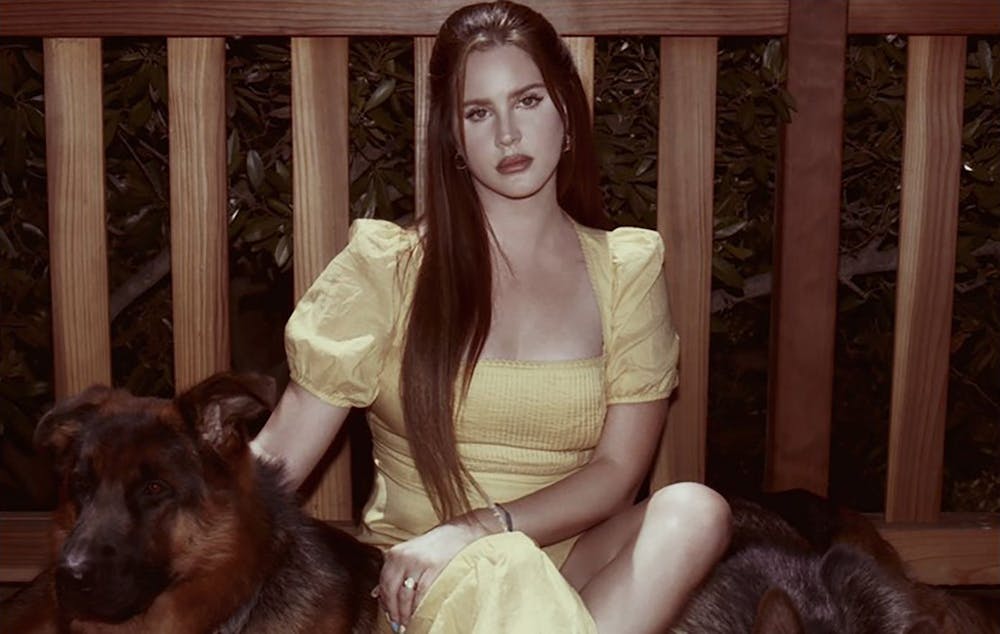By Olivia Heggarty
Lana Del Rey’s brand new album separates her from her fellow alternative artists, showing off her newly-discovered personal freedom and growth whilst never changing her signature style.
Lana Del Rey has just set a new record for the most number one alternative albums by any artist. This is a fantastic accomplishment, and somewhat unsurprising. Rey has been breaking records and the musical mould since her 2012 debut album Born to Die. Now, she’s back again in October 2021 with a brand new creation. Blue Banisters is Lana Del Rey’s second album of 2021 and her eighth studio album. Bursting with sentimentality, family ties, a collaboration with Miles Kane and a recklessly mature view of herself which contrasts her earlier works, Rey has surprised fans with another successful release in one year.
Rey opens her album with a sultry bass line in Text Book, in which she begins to reference the colour blue. This colour is referred to throughout the album, alluding to influences from Joni Mitchell’s seminal album Blue, which does much of the same thing. Rey herself is a fan of Mitchell, covering Mitchell’s song For Free on her previous album: Chemtrails over the Country Club. (Take a listen – it’s strikingly wonderful). Mitchell’s influence is also seen in many of Blue Banisters’ songs, such as the quick out-of-rhythm singing, lyrical inspiration and piano prevalence in Blue Banisters as well as within Sweet Carolina and Arcadia.
One of the most gorgeous aspects of this album is Rey’s ability to portray the tenderness of her own heart. Lyrics such as: “What you don’t tell no one you can tell me” in Cherry Blossom; to: “I’ll always be right here / Closer to you than your next breath, my dear / We love every hair on your head / Love you like God loves you” from Sweet Carolina. These songs, and each song on the album convey Rey’s history of love: stained with trouble, pain and endings, but they also show her continuous and eternal hope for each new attachment. She takes fresh chances in love in spite of her fear, and she has also done this with the album. Even more so, the impressive scope of her lyricism shows her ever-growing talent as a songwriter, and is evident all through the album. Taking chances, releasing when and what she chooses, and making music that pleases herself have all culminated in a fabulous work of vulnerability.

Regarding the album, Rey quoted: “As much as the on going criticism has been trying, it at least has pushed me to explore my own family tree, to dig deep, and to continue to exhibit the fact that God only cares about how I move through the world.” This thinking manifests itself in the crucial honesty of the album and her continuous references to her family: “I wish I was with my father / He would see us in all our splendour” from Text Book and: “Chucky’s makin’ birthday cake / Chickens runnin’, bare feet, there’s a baby on the way”, alongside “All my sisters come to paint my banisters green” in Blue Banisters. In the album, Rey has stripped herself away from the never-ceasing criticism, futile human attachments and she instead focuses on the important: family, growth and love for herself. Through all this, she does not give up on her signature open heartedness – she sings also for romantic love, longing and the reality of failed relationships. Without these aspects of her craft, she would not be Lana Del Rey. She never changes, yet always grows.
Rey’s collaboration with Miles Kane, frontman of The Last Shadow Puppets in this new album caused a huge stir on social media, with thousands of fans excited to see the pair join up. Dealer is a song which Rey and Kane curated perfectly for each other. The rhythm and drum of the verses complement Kane’s crooning, edgy voice most pleasingly and the chorus allows an absolutely stunning belt from Rey. The first time she has belted in her entire career of studio albums, Rey has left her fans lying in wait for the full capacity of her vocals. She’s known for her sultry, whispering and flirty voice and now she has displayed her incredible scope of vocal talent in Dealer. This displayal of power needed to wait for the song’s chorus of great emotive outpouring: “I don’t wanna live / I don’t wanna give you nothing / ‘Cause you never give me nothing back”. This song is truly a cathartic blessing, made to be screamed by those who just need more from the people around them.
Rey’s constant ability to bare her heart to the world in spite of hurt and criticism is the essence of Blue Banisters. Her mid-thirties seem to be providing her with fulfilment, artistic creativity and maturity to move through doubts and hatred, and allowing her to focus on the commitment to her craft. There is little doubt that the success of Blue Banisters will open up new opportunities for Rey and provide her with the confidence to keep creating imaginative, signature and deeply original music.

